
Toyota began the 2003 season with a brand new drivers line up. The experienced Olivier Panis, rookie Cristiano da Matta, and comeback man Ricardo Zonta look back at the season and analyse the team's performance as well as their prospects for the future
Olivier Panis: I have to say that the first time I tested the car I was very impressed by the potential compared with last year's car. I think we were happy during the winter tests, looking competitive – better aero, better mechanics, better engine. For me the weak point has been the inconsistency during the season. At some places we were quick and some places we were not, but I think we have learned a lot and have some good pointers for next year. The engine is one of the best I have ever driven, and I hope with the new rules next year that say we have to use just one engine over three days, we can maintain the power output and keep the reliability.
Ricardo Zonta: Compared to the old car the TF103 is a big improvement. We improved the aerodynamics a lot. There are still some problems with traction and pitch sensitivity but it has been improved a lot throughout the season. Traction is really down to suspension improvement and corner entry stability is more down to aerodynamics.
Q. Has the car achieved what you thought or did you expect better results?
Panis: I think what we didn't achieve is to translate the competitiveness of the car into good points-scoring results. Many things happened to show we were quite quick but then we had some hard times, like Imola, Monaco and Austria, but everybody in the team worked very hard to improve the car and show we were on the right path. We managed to improve the car a lot during the season. If people say we were quick during the winter tests but then didn't prove ourselves, it's true, but for a variety of reasons. Did I expect better race results? Yes, of course, but I think we demonstrated that the car was quick and that we have the potential for future seasons. What we achieved in Hockenheim with Cristiano and me in the top six was what we should have achieved in most races this year. Our qualifying performance was very encouraging. In only two races, did we not have a TF103 in the top ten on the grid, and in Indianapolis and Suzuka we qualified on the second row. For a team in its second season, this sort of performance is highly commendable.
Da Matta: Personally, it was always going to be a tougher season because I was coming into a new series for me with many circuits of which I had no prior knowledge. On most occasions, I only had one hour of free practice on Friday morning before having to qualify. That was tough, but if you look at the results from circuits where I had driven before, I think I showed my true ability. Overall, I believe we deserved more in terms of results, but we have learned a lot during the year and we should be in very good shape for next season.
Q. Olivier, you have a lot of experience of different F1 cars, where would you put the TF103?
Panis: On occasions this year, the TF103 has really impressed me and it has looked highly competitive, for example at Barcelona, Indy, and Silverstone. You sometimes feel really good pushing to the maximum but you don't know why you are a little bit away. It is something that we have to work on and improve over the winter, but I expect next year's TF104 to be capable of scoring points regularly, and who knows what else could come?
Q. Cristiano, you led the British GP for 17 laps. Was the car especially good there?
Da Matta: Silverstone was one of the circuits that really suited the TF103 and certainly one of the year's highlights. We tested there a few weeks' before the race and we went there knowing that the car was going to be competitive. I led the race benefiting from some extraordinary incidents on the track, which brought the safety car out. Of course, I have led races before, but it was a special feeling to be leading an F1 race for the first time in my rookie year.
Q. Was the team's strong performance at the Spanish GP the result of a lot of testing at the Barcelona circuit?
Panis: Our success in Spain was not entirely down to the fact that we tested a lot there. It is more relative to the circuit and the overall package -- the aerodynamics you have and the stability of the car. I tell you, when I see the resources we have, the factory we have and the people we have, we can definitely improve all the time. It is unbelievable everything Toyota has done this season – not just at Barcelona.
Zonta: We do a lot of testing at the Circuit de Catalunya and I think all testing work is beneficial regardless of whether it is successful or not. There is no substitute for mileage and data, however Barcelona is a common testing location, so all teams start the weekend with a good idea of set-up. In my opinion, our pre-season testing there helped to an extent, but the smooth operations of the team over the weekend played a big part.
Q. Cristiano, what aspects of F1 have made the biggest impression on you?
Da Matta: The thing that has impressed me the most is the speed everything happens – the development of every part of the car, from the tyres to the chassis and the aerodynamics. This is really amazing compared to all the series I have raced in before. Every race we have something different on the car and that's what marks the difference in F1. You definitely have to pay more attention to the development of the car. On the other hand, in other series, because you cannot play with things, there is more development on the set-up side. Definitely the car is a much bigger thing in F1 and there are so many more areas to work in.
Q. Cristiano, what you think of the difference in driving standards between CART and Formula One?
Da Matta: I think the fairness in Formula One is good and that was well taken care of in CART too. Every time you did something crazy it was not like F3000 or F3. The level is hard to judge because in CART you run very similar cars to everyone but here you are never going to be able to judge against whoever has a better car. But there are a lot of good drivers here, for sure.
Q. Olivier, how did you find left-foot braking for the first time this year?
Panis: Well, this is very bizarre because I never used my left foot for many years, particularly for heavy braking, but this year I didn't have any choice, due to the tightness of the cockpit around the pedals, with the room needed for the steering column. I am using it now and at the end of the year I feel like I've driven for 10 years like this. I don't have any complaints about it. Of course I did karting, which is left-foot braking, but then in F3 I was braking with my right foot because you had a clutch. It seemed more natural to use the right but this year, as I say, there was no choice. I needed 10 laps and then I felt like I'd been doing it all the time.
Panis: I feel frustrated not to have scored more points because we had the chance to. But on the other hand I'm positive about the job we did as a team. We pushed hard in qualifying and worked really well with the new rules for most of the time. From the speed point of view I'm quite happy. It's never enough until you win a race but I think we are heading in a good direction. The most disappointing race was Indianapolis, when we'd qualified extremely well in third and then we made the wrong pit call. As soon as I went out on wet tyres and realised the rain was not getting heavier, I knew any chance of a good result was all over.
Da Matta: The high point for me was just getting used to everything and getting adapted to F1. Leading Silverstone for 17 laps was the time that I enjoyed most. Qualifying in Suzuka was also very special because it was Toyota's home race, and although we went out for our runs before the rain came down, it was really thrilling to qualify third. I wasn't mentally prepared to be in the post-session press conference, which was a new experience, but one, which I hope to get used to next year! The low point, definitely, was when I was getting lapped in Brazil. I know I'm not that bad in the rain, but things were made even worse because it was my first home race in F1.
Q. Is it easier to make progress with a car over the winter or during the season?
Panis: When I compare to some teams I have driven with before, I feel that Toyota has made a big improvement during this season. I think that after Silverstone where we had the new aero package, we have been trying to improve all the time, working really hard with Ricardo too, and I think what we have achieved during the season is impressive.
Da Matta: Over the winter, it appears that you make more progress because the car is new and the margin for development is bigger, but at the same time you have to keep up momentum during the season. If you don't then you fall back. We dropped back a little at the start of the European season at Imola and Austria, but in the second half of the season, we really made steps forward at every race. One thing I learned very quickly is that development in Formula One has to be continuous.
Q. Looking at the team overall, where can the most progress be made?
Panis: I think everybody has learned a lot and the team stability is improving. We still need to improve a lot but everybody is pushing towards it. The work of the team at the track and at the factory in Cologne has been one of the things that have impressed me most about Toyota.
Da Matta: As a team, we have grown considerably this season, but we have to constantly evaluate everything we do in order to improve in all areas. Toyota's philosophy is all about continuous improvement, which is so important in F1. We have set very solid foundations for ourselves this season, but we now have to build further on these in 2004 and from there I am sure the results will come.
Zonta: We are still a young team and we still have to improve operationally. Having said that, we worked well together this year, but when we are even better at that we will go quicker. This year, we tested a lot and learned a lot and for next year we know what we need and I think it will be a lot easier. We know the two race drivers, so there will be continuity and the team will be used to working with them.
Q. How long does it take to establish a good working relationship with a team?
Panis: For me, the relationship I have with the team was good right from the first test. But, of course, I have been in the business a long time and I knew my race engineer Humphrey Corbett from Prost. But in general we had a big welcome from the team and worked closely straight away. That included Cristiano when he arrived. Toyota is still young and I think that taking two new drivers was okay for 2003, but to mount a challenge to the top teams in the upcoming years, I think that stability within the team is important.
Da Matta: It takes a little while to establish a good working relationship, but I think that the winter testing helped us develop a good working rapport before the racing season got underway.
Zonta: I'd say it takes almost three months racing to develop a smooth working relationship. Testing is one thing but racing is different. With the pressure of the weekend you need to set up the car very quickly and it helps when you are used to working together.
Q. What do you think of F1's new rules?
Da Matta: From a driving point of view, I do not have anything with which to compare the new rules. I think the rules we have had in place this season have worked well and provided a better show for the fans and spectators around the world.
Q. What can be done to improve the F1 show. And does it need to be improved?
Da Matta: In my opinion, the F1 show looks quite good already and I don't see open wheel racing getting a lot better than we had this year. I think it has been a great championship. At Indy, the penultimate race, you still had three guys separated by a few points and you can't expect better than that.
Panis: I agree with Cristiano that we have had a terrific season, but if we have more cars fighting in the top six next year maybe it can be even more fun for everybody, ourselves included.
Q. What is a realistic target for 2004?
Da Matta: For me the target for 2004 is to close the gap even more to the top teams. If we can reduce that gap, which I think is realistic, it will be a big achievement.
Panis: I think the target for us is to be consistent and score points constantly. Basically to take any opportunity we have. I am reluctant to set any specific targets until the new car, the TF104, is ready in January.
Q. How would you assess the Toyota TF103 - its strengths and weaknesses?
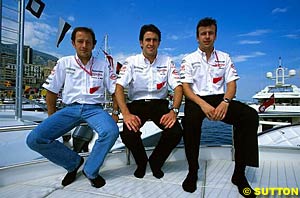 Cristiano da Matta: I agree with Olivier, the consistency was our biggest enemy this year. At some places, for no particular reason, we weren't good enough and could never relate one thing to another to understand why. I think one of the positive points has been our engine, which has been incredibly reliable throughout the season. All in all, we have a very good base from which we can create a well-rounded competitive car for next season.
Cristiano da Matta: I agree with Olivier, the consistency was our biggest enemy this year. At some places, for no particular reason, we weren't good enough and could never relate one thing to another to understand why. I think one of the positive points has been our engine, which has been incredibly reliable throughout the season. All in all, we have a very good base from which we can create a well-rounded competitive car for next season.
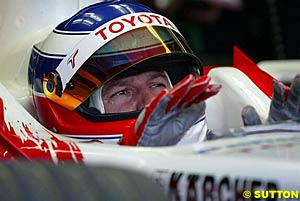 Zonta: Particularly if you look at some circuits like Indianapolis or Barcelona, we were very competitive, but at other places it was difficult to find a direction. Perhaps we need to work more toward finding the best balance for each individual Grand Prix, because sometimes it's good and sometimes it's not. From a results point of view, I think we did very well in qualifying, but for one reason or another, we just could not pick up as many points as we would have liked.
Zonta: Particularly if you look at some circuits like Indianapolis or Barcelona, we were very competitive, but at other places it was difficult to find a direction. Perhaps we need to work more toward finding the best balance for each individual Grand Prix, because sometimes it's good and sometimes it's not. From a results point of view, I think we did very well in qualifying, but for one reason or another, we just could not pick up as many points as we would have liked.
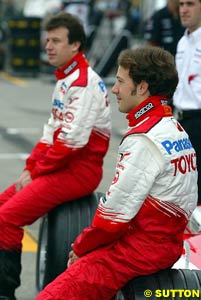 Da Matta: Toyota is still a young team with only two years of F1 experience. Barcelona was the first race of the year where everything ran smoothly for us during the entire weekend. I do not think we can attribute our 6th-place in Spain purely to testing because every team tests at Barcelona. It was simply that all the pieces of the puzzle came together, like at Hockenheim and Silverstone. It is the sort of performance that we should be aiming for at every race in 2004.
Da Matta: Toyota is still a young team with only two years of F1 experience. Barcelona was the first race of the year where everything ran smoothly for us during the entire weekend. I do not think we can attribute our 6th-place in Spain purely to testing because every team tests at Barcelona. It was simply that all the pieces of the puzzle came together, like at Hockenheim and Silverstone. It is the sort of performance that we should be aiming for at every race in 2004.
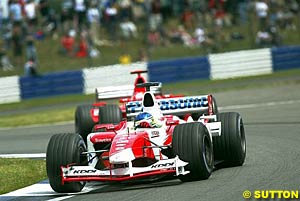 Q. Looking back at the season, what were your personal highs and lows?
Q. Looking back at the season, what were your personal highs and lows?
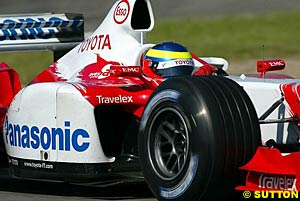 Zonta: The development of the car is essentially the main part of my job as third driver. We have had a busy test schedule this season and completed a lot of kilometres in order to keep up the progress. We have run two test teams this year, dividing the jobs up into long-term development and more race-specific preparation. This division of jobs has worked well, and I think this has been reflected in the competitiveness of the car in the second half of the season.
Zonta: The development of the car is essentially the main part of my job as third driver. We have had a busy test schedule this season and completed a lot of kilometres in order to keep up the progress. We have run two test teams this year, dividing the jobs up into long-term development and more race-specific preparation. This division of jobs has worked well, and I think this has been reflected in the competitiveness of the car in the second half of the season.
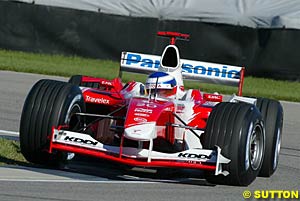 Panis: Sometimes we were lucky because the weather conditions helped mix it up in conjunction with the new rules. But I think they still work anyway, really. One lap qualifying really is tough but it's good fun too. It is never easy to produce the perfect lap, but when you have only one chance it adds pressure for sure. And for the spectators the race has mixed grids, cars that are quite close, different winners. It's good for everyone.
Panis: Sometimes we were lucky because the weather conditions helped mix it up in conjunction with the new rules. But I think they still work anyway, really. One lap qualifying really is tough but it's good fun too. It is never easy to produce the perfect lap, but when you have only one chance it adds pressure for sure. And for the spectators the race has mixed grids, cars that are quite close, different winners. It's good for everyone.
|
Volume 9, Issue 44
Toyota 2003 Review
Interview with Ove Andersson
Toyota 2003: The Drivers' Version
2003 Season Review
Rating the Great and Near-Great
The Road to Zero Defect
Ann Bradshaw: View from the Paddock
One Shot: 2003 Through the Lens
The 2003 Season in Quotes
Columns
Season Strokes
Elsewhere in Racing
The Weekly Grapevine
> Homepage |
